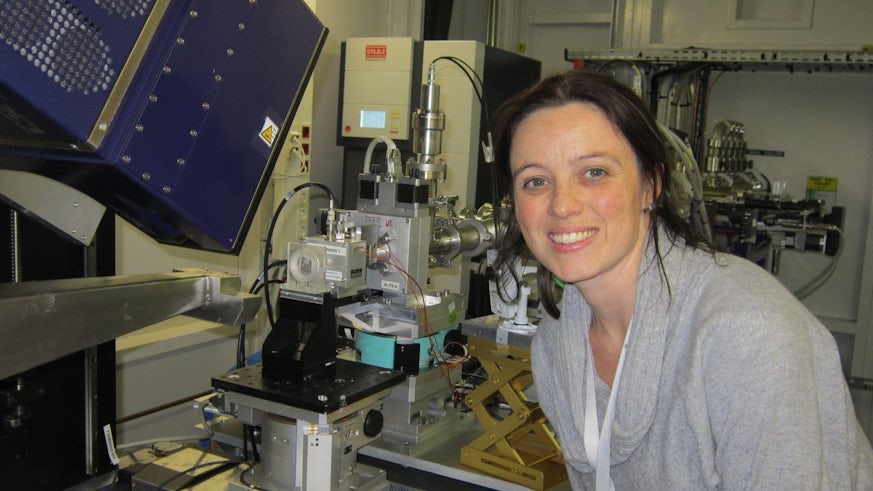Women in STEM: Dr Sally Hayes
11 February 2021

To celebrate International Day of Women and Girls in Science, we wanted to provide an insight into life as a woman working in vision sciences research.
One of our many fantastic women researchers, Dr Sally Hayes, was interviewed recently by budding scientist, Eve Cornes, for her school project on women in science. Eve is 13 years old and is the STEM (Science Technology Engineering Mathematics) Scholar at her school. In the interview, Sally talks about her journey to becoming a vision scientist, what skills are necessary to work in science and what scientific developments she was most excited by.
What area of science do you work in?
I am a vision scientist. Vision science covers everything from how we see to how and why vision fails, and what can be done about it. I am particularly interested in the cornea, the clear part at the very front of the eye that provides the eye with most of its focussing power. For the past 20-years, my research has focussed on better understanding the structure of the cornea in health and disease to develop new treatments for corneal disorders.

Why is this science important?
Changes to the shape, strength, and transparency of the cornea due to disease or injury can lead to a loss of vision and the need for a corneal transplant, whereby the malfunctioning cornea is removed and replaced with a healthy donor cornea from a deceased patient. The cornea is one of the most transplanted tissues worldwide, with over 3000 corneal transplants being performed each year in the UK alone.
However, there is a world-wide shortage of cornea donor tissue. This means that it is incredibly important that we develop a better understanding of what goes wrong in corneal disorders and find new treatments to help reduce the demand for corneal transplants. Another approach that I am looking at, along with many other scientists around the world, is the development of an artificial cornea that has the potential to reduce our reliance on human donor tissue.
What are the most important skills that you think are needed to be a scientist?
Despite lots of planning, experiments don’t always go perfectly to plan on the first attempt (or sometimes even on the second or third) which can be incredibly frustrating, and so I think patience, determination, adaptability (to try different approaches), and a willingness to contribute and share ideas with others are all incredibly important skills for a scientist. Also, our hunches aren’t always right and a good scientist must always be willing to be proved wrong and follow the evidence. You also need to be very organised and good at problem solving and having a passion for science definitely helps!
What did you do after leaving school that helped you to your current post?
After school I went straight to university to study Animal Science, specialising in Equine (horse) Science. In my final year I had to produce a piece of research. I thought long and hard about what I wanted to do and decided to go big! I arranged to travel to a stud farm in Ireland, took up a part time job there and spent every bit of my free time for several months trawling through the veterinary notes of over a 1000 horses to gather data on their pregnancies.
The collection and analysis of the data took a huge amount of hard work and determination but I found the research fascinating and was ultimately rewarded with a First Class Degree. That experience definitely sparked my love of scientific research and the research skills that I developed in the process helped to secure my current post.

What do you think are the most exciting changes in science in your lifetime?
That’s a tough one as there have been so many exciting developments in my lifetime, and I don’t even think of myself as being that old! For me, the birth of Dolly the sheep really stands out in my memory - she was the first mammal cloned from an adult cell and it seemed such a remarkable feat at the time (1997).
Although that type of cloning is rarely used now, it paved the way for some of the exciting stem cell research that is going on now. Also, in the 2010’s there were huge advances in our ability to precisely edit DNA, largely thanks to the identification of the Crispr-Cas9 system. Cas9 is an enzyme that acts like a pair of molecular scissors and can cut two strands of DNA at a specific location so that bits of DNA can then be added or removed.
This technology is extremely exciting as it has huge potential for treating a wide-range of medical conditions. Also, in my lifetime there has been a growing recognition of the importance of public engagement with research and also a greater recognition for the scientific achievements of women, which I hope will help to inspire the next generation of STEM scientists.
Several of our women researchers are involved with Women in Vision UK (WVUK), a network that promotes connections between women working in all fields related to vision. Find out more about Women in Vision.
Share this story
Our research delivers advances in knowledge to facilitate detection, diagnosis, monitoring and treatment of vision disorders to improve quality of life.

